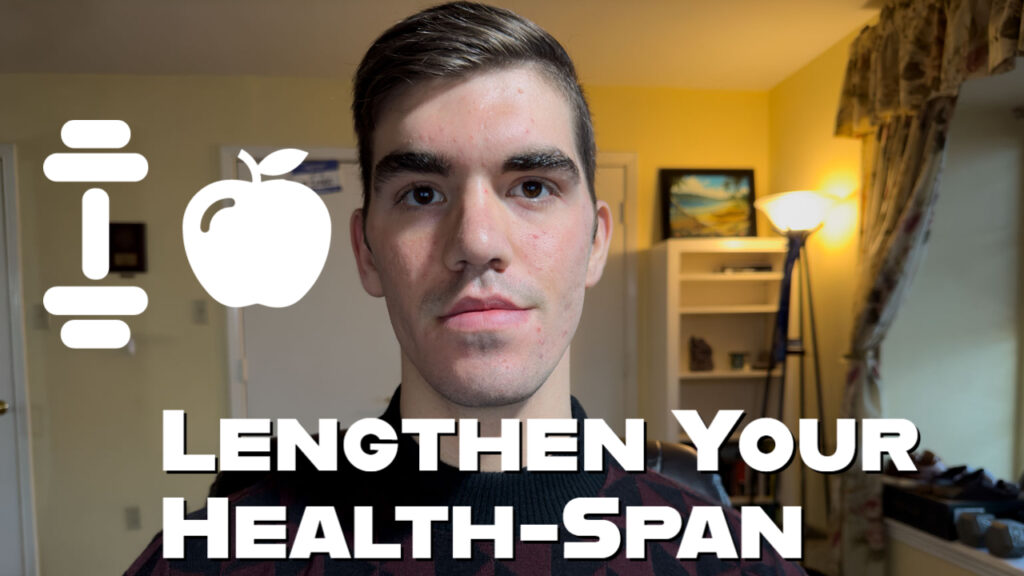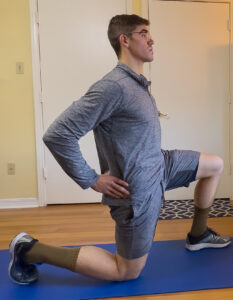Everyone faces the same challenges that aging presents the body. However, your chronological age is not the same as your biological age. In this article, I give you behavioral tools you can use to lengthen the amount of time you remain healthy as you age. As we age, our brain, heart, and movement system begin showing signs of gray hairs that can cause disability and even death. Here is how we can slow down the onset of these disease processes.
Add Cardiovascular Exercise

- Cardiovascular exercise can delay the onset of Alzheimer’s and is being looked at for its role in managing Parkinson’s disease. Additionally, VO2 max is your ability to consume oxygen and it can be improved through cardiovascular exercise. In a study comparing people of various cardiovascular fitness levels, going from low to the elite in VO2 max has been shown to reduce all-cause mortality by five times over a decade.
- ACSM recommends 150 minutes of moderate aerobic activity weekly.
-
-
- This can be running, rowing, walking, swimming, or similar cardio.
-
-
- If you are interested in Improving your cardiovascular health, here is a free program to get started.
Add Strength Training

- Aging can be done well or poorly depending on the actions we take. For instance, osteoporosis or low bone mass predisposes you to preventable injury and possible early death which can be reduced with exercise.
- Wolf’s law is the idea that your bones and muscles adapt to the stresses imposed on them. Sarcopenia is the loss of muscle mass and strength which can cause a poor quality of life and is predictive of future mortality and is due in part to inactivity.
-
- Half an hour of high-intensity resistance and impact training two times a week has been shown to be effective in improving bone mineral density and functional measures. The benefits of exercise can be received in a dose-dependent fashion as long as you work with a healthcare professional to safely implement a program. To get the most benefit I work out for strength three times a week.
-
Add Stretching
- As we age our tendons and ligaments can become stiff and inflexible. Stretching our muscles and joints can maintain our mobility and function for longer. It is possible to have an 80-year-old who is more flexible than a 30-year-old, depending on how frequently they stretch and move.
-
- Stretching can look like dynamic mobility such as high knees, or static stretching where you hold your joints at the end range. Personally, I stretch before and after each workout for 5 minutes and one day a week, I do dedicated flexibility training such as yoga.
-
- Click here for an introduction to flexibility, beginning with the hamstrings.
- Adopt a healthy posture that does not create biomechanical inefficiencies. Tuck your chin and roll your shoulders back and down.
Implement Healthy Habits
- We become what we repeat. Therefore, we should avoid opiates, alcohol, or other drugs. These destructive behaviors should be replaced with meditation, exercise, or cognitive behavioral therapy.
- Exercise can cause a healthy release of feel-good chemicals that our body naturally produces.
- A social support system can help buffer you against the ups and downs of life.
- Smoking can cause breathing disorders, cancer, and mortality, consider healthier alternatives such as meditation or reading.
- If you are religious, reach out to local clergy to get involved. If not, reach out or volunteer within your community.
Nutrition for longevity
- Your body is made of building blocks that can only be obtained through nutrition.
- Consuming 1000-1200 mg of calcium a day and 600-1000 IU of vitamin D3 can help maintain healthy bones and fight bone loss and promote healthy muscle function.
- Consuming at least 0.8 grams of protein per kilogram of body weight at a minimum can help fight muscle and bone loss. For healthy adults, I recommend 1 gram of protein per pound of body weight.
- Consuming adequate fiber, vitamins, and minerals are important to maintain healthy cell function. If you believe you may be insufficient, you should speak with a registered dietitian.
- Maintaining a healthy BMI can improve your longevity and prevent the negative impacts of obesity. Click here to learn about maintaining a healthy weight.
- Increase your hydration level. Your body is mostly water, so drinking more can prevent the dehydration of your tissues.
- Consult with your doctor before making any change to your routine.
Protect your sleep
- Sleep is important for our brain and body to heal from the damage and stress of the day. To improve your sleep view sunlight when you first wake up to set your sleep-wake cycle. Next, aim for 7-9 hours of sleep a night.
- Further, if you are serious about improving your sleep, here is a video on everything you need to know.
MY KEY LINKS:
- 💡 YouTube – https://www.youtube.com/@cartergansky
- 📸 Instagram – https://www.instagram.com/carter.r.gansky/
- 🐦 Twitter – https://twitter.com/CarterGansky
- 🌲 Linktree – https://linktr.ee/cartergansky
- 🔊 Discord – https://discord.gg/sQxvHH78Ga
WHO AM I:
I’m Carter Gansky, a fitness and health advocate and a Doctor of Physical Therapy in training. I explore the strategies and tools that help us live motivating, healthier, and more fulfilling lives.
GET IN TOUCH:
🧠 contactcartergansky@gmail.com
Any and all feedback on my content or ideas for future content is welcome!





